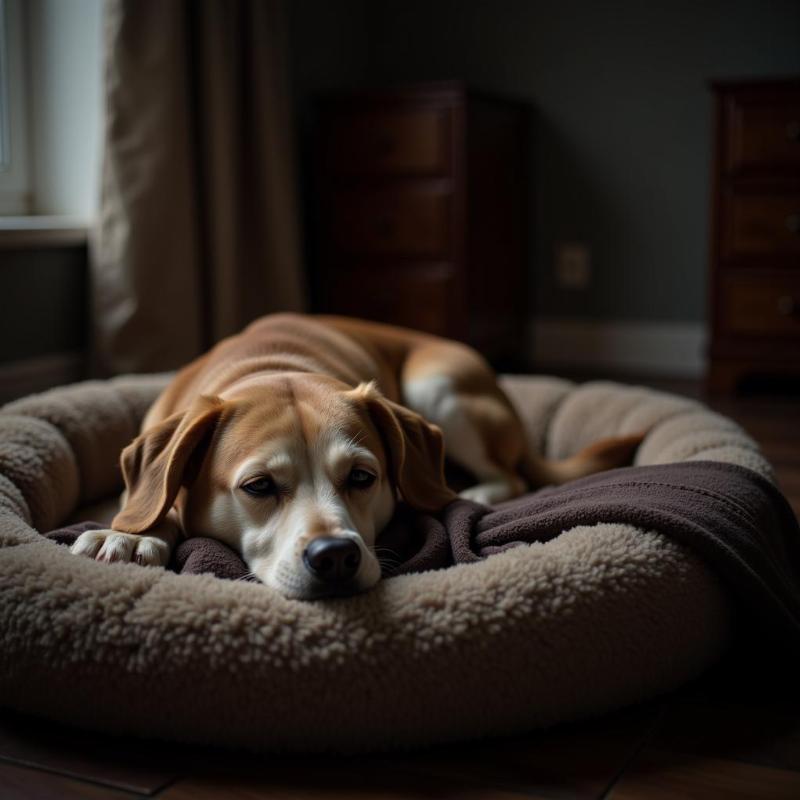Senior dog anxiety at night can be distressing for both you and your furry companion. As dogs age, they can experience changes that make them more susceptible to anxiety, especially during the quiet nighttime hours. Understanding the causes and implementing effective strategies can help your senior dog rest peacefully and improve their overall well-being.
Understanding the Causes of Senior Dog Anxiety at Night
Several factors can contribute to senior dog anxiety at night. Cognitive decline, similar to dementia in humans, can disrupt a dog’s sleep-wake cycle and lead to confusion and anxiety. Pain from arthritis or other age-related conditions can also make it difficult for senior dogs to get comfortable, increasing their anxiety. Changes in routine, loss of a companion, or even a new environment can also trigger anxiety in older dogs. Additionally, decreased senses, such as hearing and vision, can make them more sensitive to noises and shadows, exacerbating their anxiety at night.
Recognizing the Signs of Nighttime Anxiety in Your Senior Dog
Identifying the signs of senior dog anxiety at night is crucial for addressing the issue effectively. Pacing, restlessness, whining, barking, and destructive behavior are common indicators. Your dog might also exhibit clinginess, excessive panting, or changes in appetite. If you notice any of these behaviors, it’s important to consult with your veterinarian to rule out any underlying medical conditions and discuss appropriate treatment options.
Addressing Senior Dog Anxiety at Night
Fortunately, there are several strategies you can implement to help alleviate your senior dog’s nighttime anxiety. Creating a comfortable and predictable bedtime routine can help reduce their stress. This might include a calming walk before bed, a gentle massage, or providing a comfortable dog bed with blanket cave. Maintaining a consistent sleep schedule and ensuring a quiet, dark sleeping environment can also be beneficial. leaving dog home alone overnight
Creating a Safe and Secure Environment for Your Anxious Senior Dog
A safe and secure environment can significantly reduce your senior dog’s anxiety. Consider using a night light to help your dog navigate in the dark, especially if they have vision impairment. White noise machines or calming music can help mask disruptive noises. You can also provide your dog with a safe space, such as a crate or a cozy bed, where they can retreat when feeling anxious.  Chó già thoải mái trên giường Furthermore, pheromone diffusers or sprays can mimic natural calming hormones and help reduce anxiety.
Chó già thoải mái trên giường Furthermore, pheromone diffusers or sprays can mimic natural calming hormones and help reduce anxiety.
Dietary and Supplement Options for Senior Dog Anxiety
Certain dietary and supplement options can help manage senior dog anxiety. Consult with your veterinarian about incorporating calming supplements, such as melatonin or L-theanine, into your dog’s diet. A balanced diet rich in antioxidants and omega-3 fatty acids can also support cognitive function and overall well-being. dementia in dogs when to euthanize Remember, it’s crucial to discuss any dietary changes or supplements with your vet before administering them to your dog. why do old dogs pant
Conclusion
Senior dog anxiety at night can be a challenging issue, but with understanding, patience, and the right strategies, you can help your furry friend enjoy restful nights and improve their overall quality of life. By addressing the underlying causes and creating a supportive environment, you can significantly reduce your senior dog’s anxiety and strengthen your bond.
FAQ
- Why is my senior dog suddenly anxious at night? Several factors, including cognitive decline, pain, and sensory changes, can contribute to nighttime anxiety in older dogs.
- What are the signs of anxiety in senior dogs at night? Signs include pacing, restlessness, whining, barking, destructive behavior, clinginess, panting, and changes in appetite.
- How can I help my senior dog with nighttime anxiety? Creating a consistent routine, providing a safe and comfortable environment, and considering dietary supplements can help.
- Should I consult a veterinarian about my senior dog’s anxiety? Yes, consulting a vet is crucial to rule out underlying medical conditions and discuss appropriate treatment options.
- What are some natural remedies for senior dog anxiety? Calming supplements, pheromone diffusers, and a balanced diet can help manage anxiety.
- Can changes in routine affect my senior dog’s anxiety? Yes, changes in routine, such as moving or losing a companion, can trigger anxiety in older dogs.
- How can I make my senior dog’s sleeping environment more comfortable? Provide a comfortable bed, use a night light, and maintain a quiet and dark sleeping area.
Beautdogs.us is your trusted source for comprehensive dog care information, breed expertise, and product recommendations. We’re dedicated to helping both new and experienced dog owners provide the best possible care for their furry companions. Whether you’re looking for tips on senior dog care or exploring different dog breeds, Beautdogs.us is here to guide you. Contact us today for more information! Email: [email protected], Phone: +1 501-555-7529.